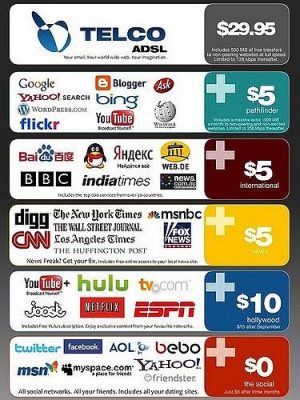Opinion: Net Neutrality threatens freedom, causing backlash
December 18, 2017

Internet service providers will
establish packages similar to
this in order for consumer to be
able to access certain websites.
After a long day of work, you open your bills and see that your internet bill has gone up $50 – a good amount when added up. Attempting to relax, you turn on your laptop, but the website you’re looking for will barely load. In frustration you exit out and go on Twitter instead – but before you can log on a message pops up, “It appears this website is not included in your current internet plan. To gain access to this website, add Twitter for $10/ month.”
This is what the internet will look like soon enough if Congress passes the bill to end net neutrality.
Net neutrality is the essential principle that Internet service providers such as AT&T and Verizon must treat all data and websites the same without discriminating by content and website or charging differently for access to certain platforms.
The reason we are able to scour the internet freely with access to all platforms, websites, and information is because of this crucial principle.
Rob Price of Business Insider, giving a further explanation on net neutrality, said, “Simply put, net neutrality means that all data on the internet is treated equally. An internet service provider can’t prioritize certain companies or types of data, charge users more to access certain websites and apps, or charge businesses for preferential access.”
Net neutrality rules under President Obama protected consumers from greedy companies attempting to exploit internet access and, most important, pricing.
Now that the Trump administration has taken office, citizens are slowly being stripped of certain freedoms with the Republicans pro-business attitude harming anyone who uses the internet – so basically all Americans.
The FCC, Federal Communications Commission, dominated by a Republican majority has only one thing on their mind – unreasonably overturning Obama’s net neutrality rules, in turn handing over apathetic Internet service providers full control over what people can access on the internet.
This intolerable, money-grubbing attempt to end net neutrality is ultimately in the interest of big companies to haul more money from consumers than they already do – and most citizens are against it.
Nationwide, people have been protesting the net neutrality bill and voicing their opinions towards the FCC. Through letter writing campaigns, emails, and calls, citizens are reaching out to their representatives in order to put an end to the bill yet so far no progress has been made.
If the bill is passed, internet users will have to pay more money for certain packages to access websites. The packages must be paid monthly and only provide access to specific sites – for example, a social media package might only include Instagram and Twitter while access to Netflix and Youtube will require purchasing a whole other package.
“Net-neutrality advocates argue that this kind of model is dangerous because it risks creating a two-tier system that harms competition,” Price said. “People will just use the big-name apps included in the bundles they pay for, while upstart challengers will be left out in the cold.” Price acknowledges that net neutrality ensures a level playing field for everyone using the internet.
Michael Hughes, a history teacher, agrees that there are negative consequences to banning net neutrality.
“Net Neutrality would limit, for one, your purchasing of an internet service for you to be able to go to any website you want and it would create a somewhat fragmented internet experience where the internet company could limit your access to a certain amount of websites,” Hughes said. “If you wanted to have more, then you would have to pay more.”
As though this is not enough, internet providers will also be able to control the speed of our internet creating slower loading times for websites they do not want us to access while creating internet fast lanes to those willing to pay a little extra.
Ali Breland from The Hill addresses the consequences of losing net neutrality and how broadband providers will be able to alter internet traffic and speeds, offering faster service to those companies willing to pay while doing the opposite to those who aren’t.
“Broadband companies could ask video-streaming giants like Netflix, which have cut into cable profits, to pay big bucks to ensure that their content reaches customers without any interference,” Breland said.
In the end, the net neutrality bill is going against the rights of citizens. In the U.S., people have a right to information and the first amendment protects our freedom of speech and press.
If companies are able to deny people access to certain information and data on the internet, then one of our basic freedoms is being denied.
Hughes said, “I think there are problems for example if you are a subscriber to AT&T and you want to Google a news story that’s critical of AT&T to learn about something that AT&T is doing wrong, they may not allow you to view that material.”
In a hypothetical situation, a company can prevent consumers from accessing media that goes against their company or their allies. This again is denying citizens of information as well as preventing others from sharing their beliefs and contradictory opinions since their voice can potentially be blocked.
“I think for the free flow of information it is important that we have access to any website that we want to view,” Hughes said. “Internet providers should not limit content based on editorial judgment or something that could be bad for their own business.”





















































